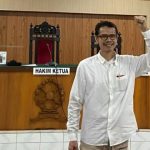Bandung (Greeners) – Three cities of West Java, — Bandung city, Cimahi, and Bandung district, are targeted to be pilot projects of zero waste cities concept, said head of International Zero Waste Cities Conference (IZWCC) 2018, Ria Ismaria, on Wednesday (7/3), in Bandung.
“We are developing pilot projects, that is why we selected big cities such as Cimahi, Bandung district, a city but with more close to as a district, and a metropolitan city, Bandung, These cities were selected because they represented different characters of cities,” said Ismaria adding that readiness, support and policies of the cities determine the selection.
Furthermore, she said that Cimahi was ready among other cities to apply zero waste cities.
“Cimahi city is ready as nearly all sub-districts have been familiarized with the concept while only two sub-districts of Bandung city, — Coblong and Cibeunying Kaler and one village, Babakan Sari. Meanwhile, Bandung district only has five villages. Basically, Bandung district and Bandung city are ready but compare to Cimahi, I think Cimahi is set,” she said.
READ ALSO: Green Watchdog: Bottled Water Companies Ranked Low on Plastic Waste Management
Deputy Mayor of Cimahi, Ngatiyana, said that waste management in the city has only been collecting, transferring and throwing, if the concept can be applied, he had hoped that domestic wastes can be separated so that people can do composting from organic waste and economic value can be generated from non-organic wastes.
“Zero waste cities is a program that needs to be implemented and our target to Zero Waste Cities in 2025 are because this waste issues have been reaching to international world. The first step, at minimum, that we must do is to reduce plastic waste in Cimahi because it contributes to 40 percent out of 200,000 tons waste per day. One way to do it is through campaigns to supermarkets and traditional markets by not using plastic wastes,” said Ngatiyana.
The administration had established Central Waste Bank (BSI), dubbed as Cimahi Central Waste (SAMICI), one of the method implemented by Cimahi city under circular economy.
SAMIC receives waste management from 160 waste banks from neighborhood units. “We are branching out SAMICI on local neighborhood units. It has been supported by separating wastes in every household and it’s coming from their own consideration to recycle their wastes,” he added.
READ ALSO: Lack of Attention on Circular Economy for Waste Management
Meanwhile, Mohamad Salman Fauzi, head of Bandung City environmental agency said that the concept needed to be implemented in Bandung city despite of it was being difficult.
“Overall, we establish spots in neighborhood units for training, there’s also Free Waste Area (KBS) so it will change culture, character and mindset, but it requires time and preparation,” he said.
Asep Kusumah of Bandung Environmental District Agency, said that important point of zero waste cities was to develop people’s awareness.
“Zero waste is a momentum to learn from other nations, don’t just observe. It is why Bandung district make the programs such as sabilulungan hiji dua (sajiwa), sabilulungan tanam pohon kesayangan (satapok), and biopori holes of which organic wastes will be given themes to develop people’s mindset and Zero Waste Cities,” said Kusumah.
Reports by Dewi Purningsih



















































